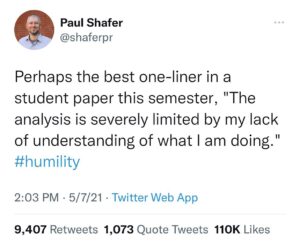Reading
It is no secret that I am critical of current scholarship in my own field of TPC (see here. and here.). Not only have I published about this, but some of you have heard me talk about it in passionate ways.
But, I want y’all to be better than me. So I want to encourage you to read constructively and critically. I’ve written about reading here. Yes. We still need criticism and pointing out where things can be improved, but it’s more productive, especially early in your careers, to gain a better understanding of what the goal of the research is and what you can potentially learn from it.
In thinking in these terms, you can better pay attention to what it was the author was trying to do, respect that action, and then consider ways that it would have been better. In challenging both the author and our own assumptions, we stand a better chance of reading scholarship in a truly, productive way.
No matter what, after reading a piece, you need to be certain that you can
- explain what the main argument is
- describe the stakes of the project (paying attention to who is included and excluded)
- identify the conversations that is trying to enter or to engage or the new conversations it wants to start
This is what reading productively means (to me) and the practice of reading we want to invoke this term. It’s also important not to just focus on where the argument or the piece fails. Grant, that’s where I (most of us) typically go first, but as I say, I want you to be better than me.
So what that means is this: reading should lead to you being able to use it for something or to know without doubt that it does not apply to your project or your research trajectory.
Some questions that are more generative than looking at what is missing or where it goes wrong are
- what does this scholarship do to help us think better or differently?
- In what ways does it open up an avenue on which we can build?(even if it is only a slight thread)
- what can I learn from this?
- how does this work with, complement, contradict, [your own word here] things I already know or believe?
- what knowledge systems does this piece hold up or challenge?
- what is missing that needs to be expanded?/
- how can my critique of [insert one thing that is bothering you about it] be shifted to change he way we see [term, concept, idea, problem]?
These questions can help you make sense of the scholarship in a more productive way and to in the words of the course work toward putting knowledge into action. Critique requires specificity and it also requires follow-up action.
